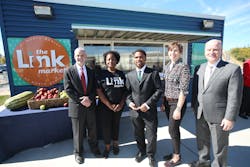New Fresh Food Kiosks to Bring Healthy Food Options to Metro Transit Riders and North St. Louis County Residents
Bi-State Development has launched an 18-month pilot program to provide access to healthy food for transit riders and residents in two areas in North St. Louis County who do not have convenient access to grocery stores or supermarkets. The new Link Market food kiosks, located at the North Hanley and Wellston Transit Centers, will officially open in the coming weeks — offering fresh fruits, vegetables, milk, eggs, bread, meat, cheese and other healthy household staples for sale. Bi-State Development, Metro transit and the Missouri Foundation for Health held a ribbon-cutting celebration on September 28 at the North Hanley Transit Center to introduce the Link Market program to the St. Louis region.
“The mission of Bi-State Development is to improve the quality of life for everyone in the region,” said John Nations, president and chief executive officer of Bi-State Development. “These kiosks have the potential to make a tremendous impact to the communities we serve, ensuring that more people have easy access to healthier foods and a healthier lifestyle.”
The Link Market food kiosk pilot program is the result of a partnership with the Bi-State Development Research Institute, a non-profit enterprise of Bi-State Development, and the Missouri Foundation for Health, which is funding the pilot program through a nearly $584,000 grant.
“By partnering with the Missouri Foundation for Health, we are able to take advantage of the region’s transit assets to provide a valuable and much needed resource to address food insecurity,” said John Wagner, director of the Bi-State Development Research Institute. “This is a win-win for the region.”
The U.S. Department of Agriculture Food Access Resource Atlas identifies many areas in the St. Louis region, particularly in North St. Louis County, as food desert locations where there is a lack of access to fresh, healthy foods. A significant number of residents of North St. Louis County live more than a mile from the nearest grocery store, and that is an even bigger issue for individuals and families who do not own or have access to an automobile.
“Twenty-seven percent of St. Louis County residents live in a food desert, meaning they do not have easy access to a grocery store,” said Rhonda Smythe, program officer with the Missouri Foundation for Health. “We are excited to partner with Bi-State Development on the Link Market food kiosk initiative. It uses innovation to improve access to healthy foods and support local farmers, and is overall a great fit for our organization.”
By placing the Link Market food kiosks at the North Hanley and Wellston Transit Centers, thousands of transit riders will be able to conveniently access the kiosks as part of their regular commutes. When the markets officially begin operation later this month, they will be open from 11 a.m. to 7 p.m., Wednesday through Sunday, and will accept cash, credit or EBT payments.
“Coupling these food kiosks with major transit centers produces an enormous benefit for the community,” said Ray Friem, executive director of Metro Transit. “When you consider all of the neighborhoods connected to our transit centers by MetroLink and MetroBus, suddenly thousands of residents and transit riders from all across the region will have access to healthier food options.”
The Link Market program is partnering with local farmers and community gardens to offer locally sourced food grown within a 100-mile radius of St. Louis. The program has also partnered with the St. Louis Agency on Employment (SLATE) to fill full and part-time Link Market positions, and with the St. Louis Area Foodbank, which is providing space for food storage and administrative functions, and refrigeration. The St. Louis Area Foodbank has promised that unused food will not go to waste.
"Link Market is more than a grocery store — our food has a mission," said Jeremy Goss, operator of the Link Market food kiosks. "Unfortunately, too many neighborhoods and too many families don't have access to healthy, affordable food. The Link Market will change that, and we can’t wait to get started.”
As part of the program, the Bi-State Development Research Institute is also partnering with the University of Missouri Extension to provide nutrition education to Link Market customers and Metro transit riders. Nutrition specialists at the University of Missouri Extension will provide education sessions twice a month at the Wellston and North Hanley Transit Centers to support the food kiosk program. Customers will be able to ask questions and learn more about the importance of proper nutrition and how to incorporate fruits and vegetables into their diets while on a budget.
"This is the type of positive investment we like to see in St. Louis County,” said Hazel Erby, St. Louis County councilwoman. “Everything we can do to provide new resources and make healthy living as convenient as possible for our residents is a real plus."


